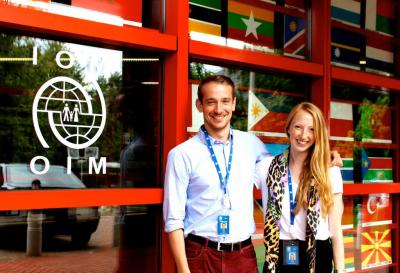Secondary menu
Rescue at Sea: Crisis in the Mediterranean
By Jordan Stone, 2L, International Organization for Migration (Geneva)
 On October 16, 2013, approximately 368 migrants drowned when their boat caught fire and sank off the Italian island of Lampedusa. This is merely one example of a continuing tragedy occurring in the Mediterranean. In 2011 and 2013 respectively, approximately 2300 and 700 people died trying to reach the Italian coast alone. Moreover, these figures do not take into account migrants attempting to reach other European borders, such as Spain and Greece, or undiscovered deaths. Migration flows from North Africa to Europe across the Mediterranean have increased dramatically in 2014. Whereas 42,000 migrants arrived in Italybyseain2013,60,000arrived in the first six months of 2014. Amongst increasing migration flows, smugglers are increasingly cramming desperate migrants onto unsafe and overcrowded vessels without sufficient fuel or life jackets.
On October 16, 2013, approximately 368 migrants drowned when their boat caught fire and sank off the Italian island of Lampedusa. This is merely one example of a continuing tragedy occurring in the Mediterranean. In 2011 and 2013 respectively, approximately 2300 and 700 people died trying to reach the Italian coast alone. Moreover, these figures do not take into account migrants attempting to reach other European borders, such as Spain and Greece, or undiscovered deaths. Migration flows from North Africa to Europe across the Mediterranean have increased dramatically in 2014. Whereas 42,000 migrants arrived in Italybyseain2013,60,000arrived in the first six months of 2014. Amongst increasing migration flows, smugglers are increasingly cramming desperate migrants onto unsafe and overcrowded vessels without sufficient fuel or life jackets.
Prompted by the Lampedusa boat disaster, increasing maritime migration flows from North Africa, and the prevalence of exploitive smugglers, the International Organization for Migration (IOM) has focused increasing attention on rescue at sea. As an intern with the International Migration Law Unit at IOM this summer, I was tasked with developing, researching, and writing an information note on the law behind rescue at sea. Information notes are used by IOM to instruct field officers and staff in local offices on the law governing a given subject.
Rescue at sea involves overlapping legal obligations arising from maritime,refugee,andhumanrights law. In particular, non-refoulement and the extra-territorial application of sovereignty play a critical role in the jurisprudence on the subject, and the two issues often intersect.
Non-refoulement is an important aspect of rescue at sea because those rescued can often be asylum seekers and refugees. The principle of non-refoulement protects all non-nationals from being returned to countries where their lives are threatened or where they risk being subject to torture or inhuman or degradingtreatment.Thus,ifan asylum seeker is rescued at sea, they cannot simply be returned to their country of origin. An independent status review must be taken by a competent national authority where there is an arguable claim that the individual at issue would be exposed to persecution or mistreatment if returned to their country of origin. Moreover, it is generally inappropriate for a status determination to take place on a vessel at sea. Consequently, in the context of rescue at sea, preventing non-refoulement is often a critical issue.
However, states are often hesitant to allow status determinations to take place on their territory, because they are then responsible for the asylum seeker. This is where extraterritoriality becomes an issue. Jurisprudence on the topic reveals consensus that non-refoulement
has extraterritorial application. According to the Inter-American Court of Human Rights and the European Court of Human Rights, states are responsible for preventing non-refoulement wherever the state exercises control and authority over an individual. Importantly a state exercises jurisdiction over a ship sailing under the flag of the state. Thus, if a rescuing vessel is flying under a state’s flag, which will usually be the case, those rescued would fall under the jurisdiction of that state. Therefore, the flag state wouldhaveanobligationtoprevent the refoulement of those rescued.
It is important to understand rescue at sea as part of a broader framework of international law. Rescue at sea is not simply a matter of maritime law: refugee law and human rights law play a critical role in guiding rescue at sea operations. At the same time, rescue at sea is much more than a legal issue. Although I had the opportunity to explore the topic from a legal perspective, devoting more attention and resources to rescue at sea operations can prevent migrant deaths more effectively. Italy, for example, has played a huge role in decreasing the number of deaths in the Mediterranean by instituting a program where rescue ships patrol the Mediterranean 24 hours a day, seven days a week. However, the program is being funded by the Italian government alone, who cannot continue the operation without additional financial support. Hopefully, with increased attention from the international community and organizations such as IOM, enough resources will be devoted to rescue at sea operations to prevent another tragedy like the one at Lampedusa from occurring again.
Photo: IOM interns Jordan Stone and Emma Julian in front of the IOM head office (credit: Heather Cameron)
